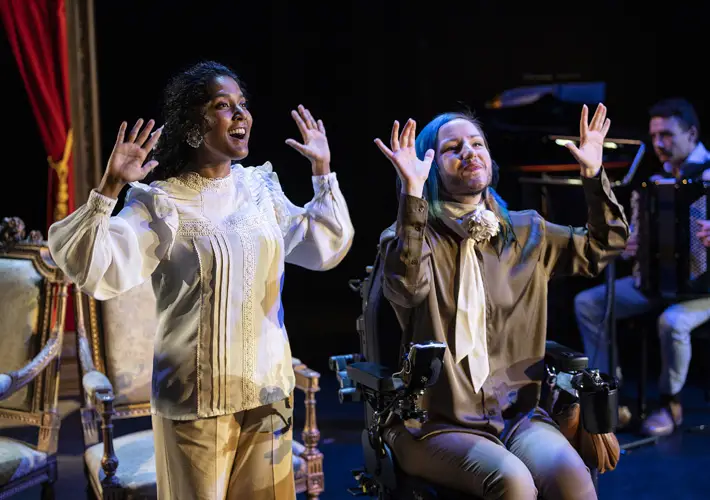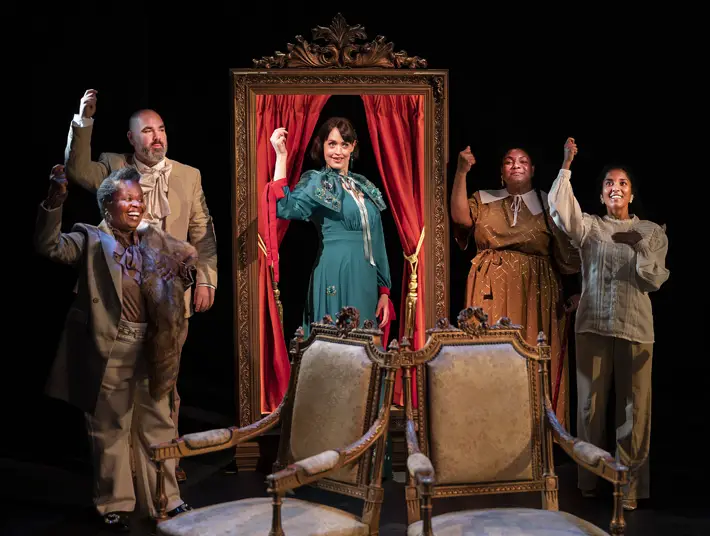Le Paradis Files – Review – Sheffield Crucible Theatre

By Clare Jenkins, May 2022
When Prince Harry married Meghan Markle four years ago, one of three pieces of music played by cellist Sheku Kanneh-Mason during the ceremony was a Sicilienne, said to be by the 18th Century ‘Blind Enchantress’ Maria Theresia von Paradis. If true, the Austrian pianist and composer would have been in good company – the other two works were by Faure and Schubert. In fact, its origins are now in doubt, thanks to more recent research.
No matter. At least it brought von Paradis back into the conversation. And now Errollyn Wallen’s chamber opera ‘Le Paradis Files’, staged by the disability- and diversity-championing Graeae theatre company, is continuing that conversation. Over the course of just 70 minutes, it explores the extraordinary life of a woman who lost her sight as a child but went on to wow Europe. She studied with some of the most celebrated musicians of the time – including Antonio Salieri, Peter Shaffer’s villain in his play Amadeus – and wrote operas, cantatas, choral pieces and piano concertos, most of which are now lost. She later founded a music school for blind girls and, although she never married, she had a stillborn child. She also impressed Mozart so much he wrote a piano concerto specially for her.
Together with librettists Nicola Werenowska and Selina Mills, Wallen has chosen to concentrate on the woman more than on the musician. And because of Graeae’s commitment to equality, von Paradis’s blindness and its effect on her and those around her is the main focus.
“Tight-knit ensemble work”
The evening starts with a prologue in which the cast introduce themselves and their roles, with nice humorous touches: ‘I’m Ella, I’m white, trans, small and fat, average height – but pretty cute… This is Max, blue hair, wheelchair, lipstick, beard, heels – well, tonight in knee-high suede boots with diamante buckles…’
It could be arch, but in fact it’s disarming, and sets the engaging tone for the evening. The singers are joined on designer Bernadette Roberts’ simple yet imaginative set (the lovely fortepiano is particularly clever) by five musicians from the BBC Concert Orchestra and conductor Andrea Brown (self-described as ‘she/her, white and a little bit Chinese’). Also with them, and very much part of the action and the emotion, are British Sign Language interpreters Chandu Gopalakrishnan and Max Marchewicz, the latter in an electric wheelchair. They don’t simply sign (supremely gracefully) for the main characters, they are ‘made visible’, unobtrusively reflecting joy, sadness and anger and responding to all that is happening onstage.
The result is a firm sense of tight-knit ensemble work, heightened by the fact that everyone wears stylish pale brown and cream linen – except mezzo soprano Bethan Langford, elegant in turquoise and mesmerising as Maria Theresia (known as Theresia), showing vulnerability as well as strength of character. Forced to endure a series of unsuccessful and pain-filled cures for her blindness – ‘Cutting, bleeding, heating and freezing’ as she and the chorus sing – she eventually rebels, causing a major fall-out with her Baroness mother (Maureen Braithwaite, mournful and full of regret).
The relationship between the two women is central, as is Theresia’s relationship with her protective and consoling maid Gerda (another bright and appealing stage presence in Ella Taylor). Langford charmingly expresses her mutinous anger with the one, her skittish playfulness with the other. The fact that she is herself visually impaired adds to the conviction of her performance.
“Lively score”
Much of the narrative – loosely based on real life – focusses on these relationships, starting with the Baroness visiting her daughter at the girls’ music school Theresia has set up, hoping for a reconciliation. A series of short flashbacks then show us the younger woman fending off the unwanted attentions of her teacher Salieri (Ben Thapa, ‘British Asian, bald, bearded and tall’), her sufferings at the hands of various doctors and quacks, her excitement when she tours Europe, her ambiguous relationship with her father (Omar Ebrahim, ‘handsome, deaf, mixed heritage with twinkly eyes’), the pain of losing a stillborn child. In quick-fire scenes, the story is helped along by the chorus of Gossips – the multi-tasking cast, including Andee-Louise Hypolite – and some witty video captioning. Jenny Sealey’s clever, cabaret-style direction ensures that the show is always accessible.
Wallen’s lively score itself echoes various periods and styles – Viennese waltzes, Parisian salons, a touch of ragtime here, a hint of music hall there: what Wallen has called ‘irreverent anachronism’, but which some might find dissonant and discordant, despite the orchestra’s efficient efforts. It also leaves gaps where emotional expansion should be.
Overall, the opera rather edges out Theresia’s musical achievements, instead highlighting her courage at defying convention and repositioning her as a spirited feminist icon. A more rounded picture of her as a performer could have given us a clearer vision of her accomplishments, mixing with some of the most celebrated musicians of her time, and moving from singer and pianist to composer to teacher.
But it’s a fine example of how opera can be made inclusive and completely collaborative. At the end, you half-expect the cast to sit down on stage and ask the audience how it was for them. Just for the record, I asked various members of the audience that question and was told ‘Fantastic… just wonderful… not what I expected but I really enjoyed it… Not really our kind of music… had to turn my hearing aid off as the noise was starting to give me vertigo… I’ve only been to one opera before, La Traviata, and I much preferred this.’
Verdi, watch out.
images: Patrick Baldwin











